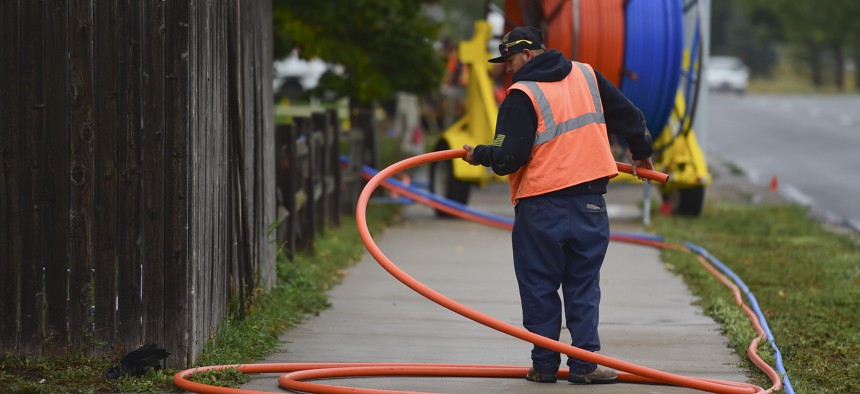
Matt Jonas/Digital First Media/Boulder Daily Camera via Getty Images
Bridging the Digital Divide with American Rescue Plan Act Funding
One year after ARPA was signed, states, cities and counties are making meaningful progress to expand broadband access.
In this day and age, access to broadband is not a luxury. Trust me—I know.
In 2019, the National Digital Inclusion Alliance named Brownsville, Texas, as one of the “Worst Connected Cities” in the country. That was the same year I was elected mayor.
At the time, two-thirds of households lacked high-speed (cable, DSL or fiber) internet access. I knew that if Brownsville was going to be a thriving community, the issue of broadband must be one of my top priorities.
Then came the Covid-19 pandemic, which placed a huge spotlight on the digital divide. Throughout 2020 and 2021, we saw schools close and many businesses transition to working from home. The sudden transition was harder for some than others. A Rice University study of the Houston area in March 2021 found one in three Black families and one in four Hispanic families reported challenges with internet and/or digital access, compared to just one in 10 white parents.
Across the country, lack of high-speed internet forced some students to park outside libraries in the evenings so they could access free Wi-Fi just to complete school assignments. And the ability to work from home was only available to those who had the means and resources to do so.
Like many other elected officials, I knew that bridging the digital divide would be one of the key issues to ensure today’s workers, and our children, would be ready for the jobs of tomorrow. And this past year, we were aided by the passage of the American Rescue Plan Act that was signed into law on March 11, 2021.
In Brownsville, we are using those funds to build out 95 miles of "middle-mile" infrastructure to bring high-speed internet to homes throughout some of our most underserved communities. These investments will bring down the cost for residents, add resiliency to existing networks, and create the infrastructure that will make possible the all-important “last-mile” work.
And Brownsville is not alone in making this kind of investment. I’m part of a network of NewDEAL Leaders, consisting of state and local elected officials across the nation who share an innovative, results-driven approach to governing. Some of my colleagues making progress on internet access include Mayor Kate Gallego of Phoenix, who has worked with local providers to ensure 250,000 families have high-speed internet for students in some of the city’s most high-need areas.
Delegate Brooke Lierman spearheaded legislation to set up Maryland’s Office of Statewide Broadband in 2021. With the support of ARPA funds, the office is providing grants of up to $10 million to local jurisdictions to extend existing broadband service to unserved areas.
And in Santa Cruz County, California, the government is partnering with a local ISP provider to bring broadband access to 4,000 local residents through ARPA funding, with a focus on rural areas.
Throughout the country, the American Rescue Plan has enabled dozens of other local officials to tailor investments where we need it most. According to Brookings, there are nearly 50 projects to expand access to broadband across 39 localities. A separate analysis from FiveThirtyEight showed 22 states have spent $7 billion from ARPA on broadband efforts.
Still More to Do
Looking ahead, my colleagues and I are not done making improvements. Broadband access is a major component of the Infrastructure Investment and Jobs Act. The progress made with funding from ARPA is crucial for laying the groundwork for maximizing the impact of those further investments coming down the road.
Access to broadband will help students keep up with their homework, even as schools have reopened. It’s a way for grandparents to keep in touch with children and grandchildren. It’s a way for local elected leaders to get the word out about how residents can get Covid-19 vaccines and access other key services. And it is increasingly how we apply for jobs, perform work and access health care.
Leaders in Congress, along with President Biden, trusted local leaders to make smart, high-impact investments through the American Rescue Plan. Only one year after the bill was signed into law, that trust is already paying dividends here in Brownsville and across the country.
Elected in 2019, Trey Mendez is in his first term as mayor of Brownsville, Texas and is a member of the NewDEAL Leaders network.






